#denis diderot
Text





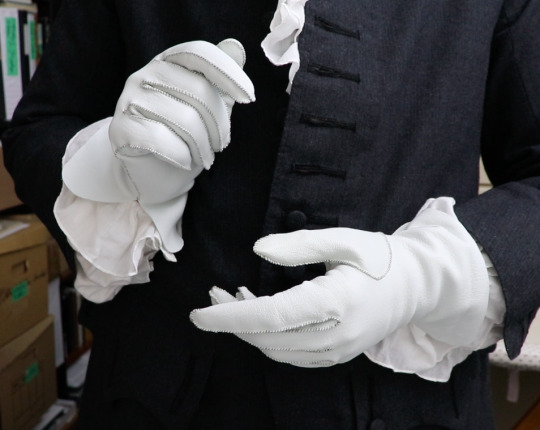
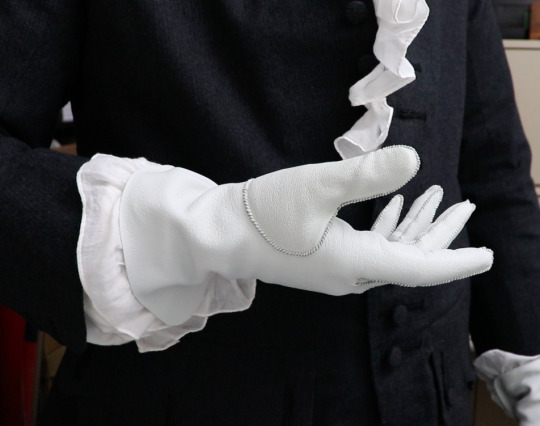
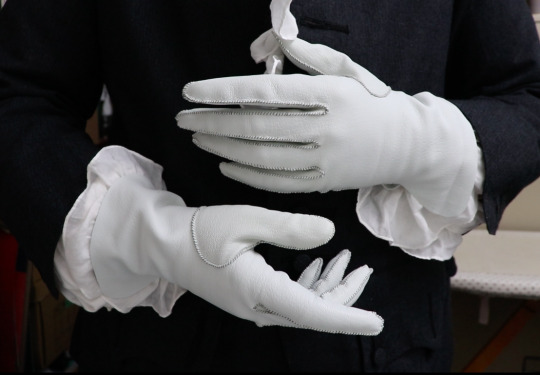
I made a pair of gloves based on the pattern diagrams in Diderot's 1765 Encyclopedia. This is my 3rd time making gloves, but my first time using actual nice new leather for it. (The first pair I ever made was re-used leather from an old jacket, and it was weak and tore, and the second pair was re-used suede from a skirt which had next to no stretch.)
These are made from a goatskin I've had in my stash for years, and which is a bit thicker than I'd prefer and not a very nice shade of greyish off-white, but I wanted to be sure my pattern was perfect before cutting into the nice lambskin I bought more recently.
I first drew up my glove pattern back in 2018, and made a few slight changes before sewing it up this time, and even more changes afterwards. (Photograph is of the pattern after all these changes.) I found that the first finger I sewed up was too big, so I trimmed down all my fourchettes before sewing up the rest of them, and narrowed the pattern pieces accordingly. The thumb fits quite badly here too, so I lengthened it and nipped in the sides where it was too loose.
They only took about 9 hours total, and I didn't get any progress photos, but will hopefully remember to next time.
583 notes
·
View notes
Text
Who's your favorite philosopher of the enlightenment? Locke? Voltaire? Rousseau? WRONG.
Diderot is the greatest philosopher of the enlightenment because he was the only one who did shit.
Voltaire was all bark no bite, Locke had his head so far up his optimistic ass that he couldn't have implemented any of his ideas if he tried, and Rousseau was Rousseau.
All of the enlightened philosophers believed in and advocated for equal education yet Diderot was the only person to actually provide it.
With his Encyclopedia he managed to distribute knowledge regardless of social class. It started out only for the rich but with modified versions, thinner paper and less pictures, he was able to make it cheaper and available to all. It became a household item that could teach people anything they needed to know.
Was it free schooling? No. But, as a commoner, it was both the most he could do and the biggest step towards indiscrimant education that any philosopher had ever taken.
Diderot is THE best philosopher of the enlightenment, period.
#thank you for coming to this ted talk#and this is obvi my opinion#there are no correct answers#but there is a wrong one and that's Rousseau#If your FAVORITE enlightenment philosopher is Rousseau then get help#denis diderot#voltaire#john locke#montesquieu#forgot to mention him#jean Jaques Rousseau#the enlightenment
1K notes
·
View notes
Text
Walks up to a couple: Soo, which one of you is the Prussian-born monarch with emotional baggage and which is the overly dramatic French philosopher they can't help but keep throwing their money at?
#fritz and voltaire#catherine and diderot#if you care to know#obligatory weird that it happened twice reference#history shitposting#voltaire#frederick the great#catherine the great#denis diderot#1700s#the Franco-Prussian patronage/support system/marriage from hell is something that can be so personal#like you don't understand#18th century#history memes#age of enlightenment#prussia#french philosophy#hall of fame
138 notes
·
View notes
Photo

We don’t need gods or kings to tell us what to do. We’ll work it out on our own. Thanks.
362 notes
·
View notes
Photo
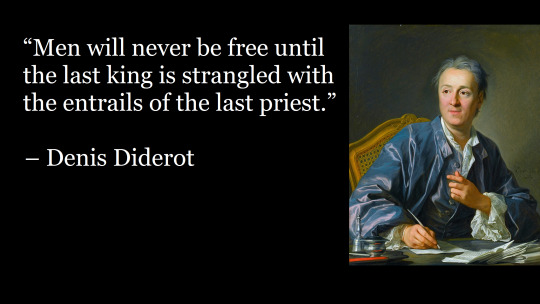
My favourite quote.
340 notes
·
View notes
Text
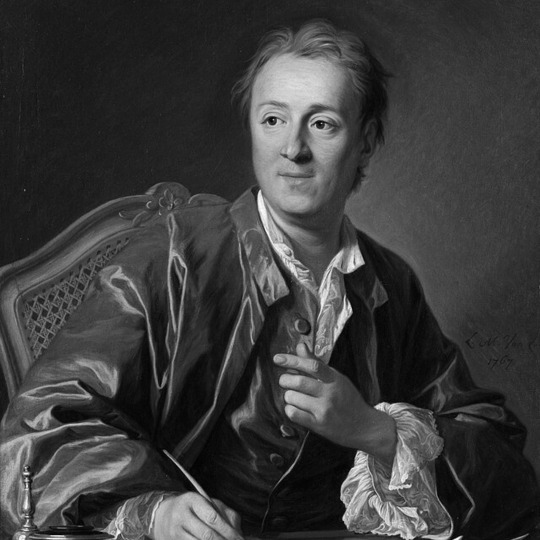
“We swallow greedily any lie that flatters us, but we sip only little by little at a truth we find bitter.”
— Denis Diderot, “Rameau's Nephew”
#denis diderot#literature#lit#literature lover#literature quote#literature quotes#french literature#philosophy#philosophical#philosopher#philosophers#philosophy of life#philosophy quotes#french philosophy#quote#quotes#excerpts#excerpt#quoteoftheday#booklover#book#bookworm#books#book quotes#book quotations
63 notes
·
View notes
Text
Bring your lips to mine / so that out of my mouth / my soul may pass into yours
Denis Diderot, from ‘Chanson dans le goût de la romance’, quoted in ‘A Lover’s Discourse’ by Roland Barthes, tr. Richard Howard
298 notes
·
View notes
Text

25 notes
·
View notes
Text
1341- Cuidado con el hombre que habla de poner las cosas en orden. Poner las cosas en orden siempre significa poner las cosas bajo su control.
(Denis Diderot)
#palabras#frases#textos#pensamientos#vida#orden#dictadura#textos nocturnos#proverbios#denis diderot#books & libraries
14 notes
·
View notes
Text
"I write without seeing. I came. I wanted to kiss your hand . . . This is the first time I have ever written in the dark . . . not knowing whether I am indeed forming letters. Wherever there will be nothing, read that I love you."
— Diderot, Letter to Sophie Volland, June 10, 1759. From Jacques Derrida's Memoirs of the Blind, trans. Pascale-Anne Brault and Michael Naad, 1993.
#rochester/jane anyone?#jane eyre#denis diderot#literature#french literature#french#quotes#love#blindness#romance#romanticism#dark academia#aesthetic#jacques derrida#translation#book#memoirs of the blind
16 notes
·
View notes
Text
What is it that moves us when we see a man animated by some great passion? Is it his words? Sometimes. But what never fails to stir us is cries, inarticulate words, a broken voice, a group of monosyllables with paused in between, a murmur, impossible to describe, deep in the throat or between the teeth.
Denis Diderot, from "Conversations on The Natural Son" in Selected Writings, excerpted in Theatre/Theory/Theatre, ed. Daniel Gerould
37 notes
·
View notes
Text
Excitedly started telling my friend about some 18th century drama (V/Émilie/Fritz, may have thrown Catherine and Diderot in there, possibly moved onto ancient Rome at some point though I cannot say for sure) and she just blinked and asked "is this like, from a fan fiction?"
Which honestly, fair. The level of insanity is so high that it does sound made up. But I have the receipts, I have the letters.
Moral of the story, the past is often wonderfully weird and beautiful and more people should know about it instead of seeing history as nothing but a long list of kings and battles!
#history#rant#french history#ancient rome#roman republic#history memes#frev#voltaire#frederick the great#émilie du châtelet#denis diderot#catherine the great#european history#history shitposting#18th century#1700s#enlightenment#age of enlightenment
24 notes
·
View notes
Text
Diderot would definitely be on tumblr if he was alive today.
Someone writing an novel length piece of lesbian nun erotica that they pretended was a real account in order to troll one of their friends is exactly the type of thing someone on this website would pull
20 notes
·
View notes
Photo
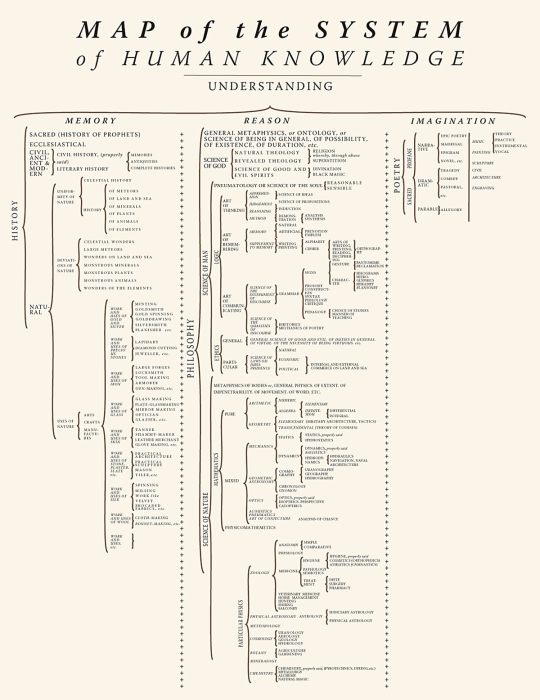
The famous figurative system of human knowledge was originally designed in French for the Encyclopédie by Jean le Rond d’Alembert and Denis Diderot.
Known as the tree of Diderot and d’Alembert, it is a detailed classification chart that represents the structure of knowledge itself.
(via The classic map of human knowledge (English edition))
22 notes
·
View notes
Text
But, Reader, why must there always be love stories? I've already written you one, two, three, four love stories and you're due another three or four and that's a lot of love stories. Still, on the other hand, since I'm writing this for you, I must either proceed with your approval or give you what you want. And that fact is that you have a decided taste for love stories. Nearly all your poems, elegies, eclogues, idylls, lyrical ballads, epistles, comedies, tragedies and operas are love stories. Nearly all your paintings and statues are basically love stories. All you've ever wanted since the day you were born was to gobble up love stories and you never get tired of them. You've been fed a diet of them and you'll be kept on it for a long time yet - men and women, old and young - and you'll never ever get sick of it. It really is astounding! I wish the story of the Marquis des Arcis was another love story, but I'm afraid it isn't and you'll get bored with it. It's bad news for the Marquis des Arcis, for Jacques's Master, for you, Reader, and for me.
Denis Diderot, Jacques the Fatalist (trans. David Coward)
9 notes
·
View notes
Text
bir mektubunda insanlar arasındaki yalnızlığın çöldeki yalnızlıktan daha acımasız olduğunu ileri sürüyordu.
lars svendsen - yalnızlığın felsefesi
#lars svendsen#yalnızlığın felsefesi#felsefe blog#stoa felsefesi#1844 felsefe el yazmaları#karl marks#yabancılaşma#charles bukowski#denis diderot#rousseau#dante alighieri#bertolt brecht#milan kundera#franz kafka#bilge karasu#küçük prens#kitap#edebiyat#blogger#felsefe#kitaplar#blog#kitap kurdu#şiir#friedrich nietzsche#böyle buyurdu zerdüşt#kürk mantolu madonna#charles baudelaire#sokrates#platon
23 notes
·
View notes